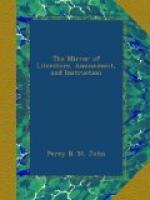“And this is why my spleen’s
above
The power of words;—’tis
that they can
Make the vile semblance be to Love
Just what the Monkey is to
Man!
“But yonder I, methinks, can trace
One very different
from these—
Her features speak—her form
is Grace
Completed by the touch of
Ease!
“That opening lip, that fine frank
eye
Breathe Nature’s own
true gaiety—
So sweet, so rare when thus, that
I
Gaze on’t with joy,
nay ecstacy!
“For when ’tis thus,
you’ll also see
That eye still richer gifts
express—
And on that lip there oft will be
A sighing smile of tenderness!
“Yes! here a matchless spirit dwells
E’en for that lovely
dwelling fit!—
I gaze on her—my bosom swells
With feelings, thoughts,——oh!
exquisite!
“That such a being, noble, tender,
So fair, so delicate, so dear,
Would let one love her, and befriend
her!—
—Ah, yes, my
Chosen One is here!”
London Magazine.
* * * * *
TRAVELLING ON THE CONTINENT.
The man whom we have known to be surrounded by respect and attachment at home, whose life is honourable and useful within his proper sphere, we have seen with his family drudging along continental roads, painfully disputing with postilions in bad French, insulted by the menials of inns, fretting his time and temper with the miserable creatures who inflict their tedious ignorance under the name of guides, and only happy in reaching any term to the journey which fashion or family entreaty have forced upon him. We are willing, however, to regard such instances as casual, and proving only that travelling, like other pleasures, has its alloys; but stationary residence abroad brings with it other and more serious evils. To the animation of a changing scene of travel, succeeds the tedious idleness of a foreign town, with scanty resources of society, and yet scantier of honourable or useful occupation. Here also we do but describe what we have too frequently seen—the English gentleman, who at home would have been improving his estates, and aiding the public institutions of his country, abandoned to utter insignificance; his mind and resources running waste for want of employment, or, perchance, turned to objects to which even idleness might reasonably be preferred. We have seen such a man loitering along his idle day in streets, promenades, or coffee-houses; or sometimes squandering time and money at the gambling-table, a victim because an idler. The objects of nature and art, which originally interested him, cease altogether to do so.




